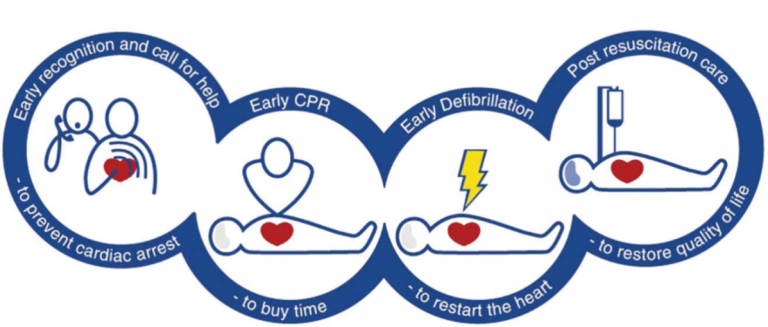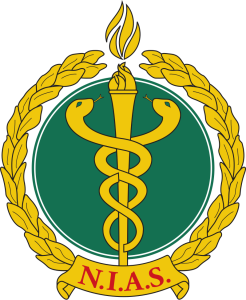About
Frequently Asked Question
Training to become a CFR is delivered by the Community Resuscitation Team within NIAS or, with prior agreement can be delivered jointly with appropriately trained personnel from the Scheme. After completing a two day Initial Training course, CFRs will be offered or signposted to relevant additional training. Upon completion of Initial Training it is recommended CFRs will be buddied with a mentor. This will allow them to build confidence by working alongside a more experienced CFR.
In Northern Ireland, over 1450 people had an “out of hospital cardiac arrest”. Less than 10% survived to discharge. These figures do not compare favourably with the rest of the world. A concentrated effort is being placed on improving them with simple skills that save lives. significantly increased. This led to significant research within the field of resuscitation and the concept we know as the “chain of Survival”.
- First Responders influence the first three links of the “chain”. In doing this, it shows that survival rates for out of hospital cardiac arrests can improve. This is the primary purpose of Community First Responders.
- The action of First Responders can result in improvement and reassurance for patients suffering from other conditions as well as providing valuable assistance and information for attending ambulance crews.
- Due to ambulance response times there is an ever increasing need for responders to provide early assessment and intervention.
- Dr Richard Cummins, Seattle, USA realised that if a particular sequence of events took place during an out of hospital cardiac arrest, the patients’ chances of survival were significantly increased. This led to significant research within the field of resuscitation and the concept we know as the “chain of Survival”.
Community First Responder schemes are made up of volunteers who live or work within a community or village.
They are trained to attend specific 999 calls to compliment and support NIAS.
They are a vital link in the chain of survival.
Having someone in the community who is trained and can reach the patient quickly, makes all the difference.
The role is highly varied and encompasses many elements, the main ones being:
- To attend appropriate calls as directed by NIAS.
- To provide the appropriate and necessary treatment to a patient before an ambulance resource arrives.
- Inform the attending ambulance personnel of assessment and interventions carried out, along with any other relevant information
- To accurately document and record any relevant history and treatment given using the NIAS Patient Report Form(PRF)
- The provision of continuing care under the direction of the ambulance crew, when required.
- To remain at the scene of an incident until released by ambulance personnel.
Many ambulance crews will ask for your assistance in certain circumstances. You are not obliged to help, but any assistance is greatly appreciated.
The arrival of a CFR is complementary to the arrival of an ambulance and is not counted as the ambulance response time.
- CFR’s are being trained to deal with a range of life treating emergencies and medical conditions such as:
- Heart attack/cardiac arrest
- Unconsciousness
- Choking
- Patients suffering a stroke
- Patients who are convulsing
- Patients that are having a diabetic crisis
CFRs can be volunteers from a number of different sources, typically
- Lay members of the public
- Off-duty ambulance staff
- Other emergency services staff
- Nurses
- Doctors
Previous experience of first aid or medical knowledge is not necessary as training is provided by the Community Resuscitation Team prior to being alerted by NIAS
- Over 18 years old
- Reasonably physically fit
- Have a caring and sympathetic nature
- Be reliable, honest, trustworthy and mature
- Willing to undergo and successfully pass the Access NI vetting process
- Able to work on your own and also as part of a team
- Ideally be able to drive and should have a clean un-endorsed driving licence.
- Before being approved as a CFR, volunteers are required to agree to and abide by the contents of the Memorandum of Understanding with NIAS and the Scheme’s Governance Handbook.
- NIAS has the authority to suspend or terminate the services of any CFR scheme or volunteer following any breach of the framework or MOU.
Training to become a CFR is delivered by the Community Resuscitation Team within NIAS or, with prior agreement can be delivered jointly with appropriately trained personnel from the Scheme. After completing a two day Initial Training course, CFRs will be offered or signposted to relevant additional training. Upon completion of Initial Training it is recommended CFRs will be buddied with a mentor. This will allow them to build confidence by working alongside a more experienced CFR.

Join an existing Scheme
Be part of your local CRF scheme. To find out if there is a Scheme where you live, please click

